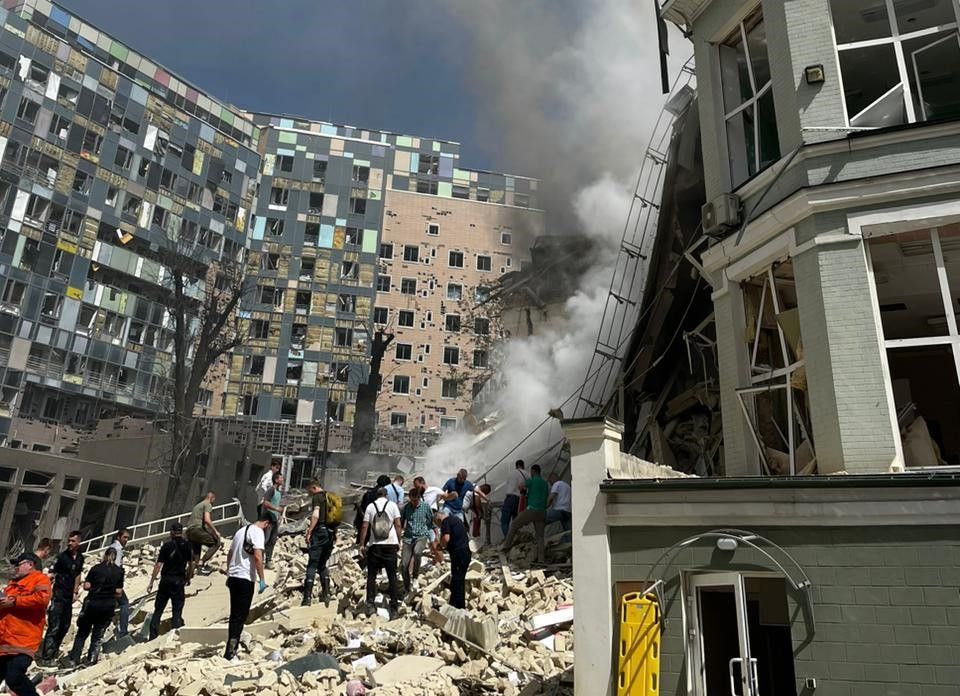'I want Russians to feel it on their own skin': Shock, fury at the site of children's hospital attack

Six-year-old Sonya, who lives with her mother in a residential building near the strike on Okhmatdyt hospital, was injured despite taking shelter in her bathroom. (Anya Korzun)
Nurse Olesia Filonenko was preparing for the first operation of the day at the Okhmatdyt children's hospital in Kyiv when she heard explosions "somewhere far away."
"Then, in a second, everything was blown away," she told the Kyiv Independent.
"Dust, smoke. We were all blown out of the operating rooms and into the corridors."
Russian forces had just launched a massive missile strike on cities across Ukraine, with Kyiv coming under particularly heavy attack.
Okhmatdyt hospital – the country's largest children's medical center – was struck by a Kh-101 cruise missile, according to the preliminary data obtained by the State Security Service (SBU).
At least two people were killed, and at least 16 people were injured, including seven children, officials have said.
Largely obscured from the main road, the sight of some 50 rescue workers marching into the grounds, many armed with shovels, indicated the situation at the site.
At the main entrance, frantic parents begged for information from police officers who had none to give.
Inside the grounds of the hospital, the corner of one building was just rubble. Not a single window remained in the ten-storey building next to it.
By the cardiology unit, which escaped the worst of the explosion, three women stood cradling their babies, trying to comprehend what had just happened.
Olena Kroyter and her two-month-old son Ethan were sheltering in the basement of the cardiology unit when the missile struck. The room they had been in just moments before was "shattered" by the explosion.
"The baby's health (issues) meant today we were supposed to be transferred to (the building that was hit), but now we are going home."

The grounds of the hospital were soon crisscrossed with human chains, some passing rubble in one direction, others passing water, apples and bananas in the other.
At the site of the strike, one chain reached the first floor of the still smoldering building, people standing on nothing but the remains of an entire corner of the structure.
Yevheniia, an anesthesiologist from the impacted toxicology unit who declined to provide her last name, was sheltering in the basement when the missile hit.
"This building was shaken so much that all the furniture shattered despite it being the shelter," she told Kyiv Independent.
"All the windows were blown out. Half of the building (nearby) was destroyed."
In the baking July sun, firefighters grabbing a few moments of respite either doused themselves with water or sat on the grass vacantly, staring at nothing in particular.
Then, with the rescue operation only just getting going, the air raid sirens again sounded across Kyiv.
Ever fearful of Russian double-tap strikes that target rescue workers, many in the vicinity of the hospital crammed themselves in a small underpass just outside the main gate.
A dark space was soon packed with at least a hundred people. Another explosion from somewhere over the city made them jump as one.
As a wave of startled shrieks subsided, it was replaced with the sound of a woman having a panic attack in the darkness, her friends trying to convince her she was safe.
In the cramped space, the temperature quickly rose, and seemingly out of nowhere, bottles of water appeared for anyone who needed one.
Above ground, this was being replicated on a massive scale as Kyiv's residents came to help out in any way they could.
One man headed to the site of the attack with two shovels, brand new with their labels still on, bought from a nearby hardware store.
A reception area not damaged by the strike was empty an hour ago—now it's filled with volunteers bringing food, towels, and power banks.
Now working as a fundraiser at the Superhumans Center, Yelyzaveta Polyakova was a former anesthesiologist.
"I spent a lot of time here during my student years, and it is very painful for me to watch this," she told the Kyiv Independent.
"We came after the attack. We distribute food and water to hospital workers and all those who help."
The clean-up and rescue operation at Okhmatdyt hospital is still ongoing, just as it is at 50 other locations across Ukraine hit in today's attack.
At least 33 civilians have been killed and 136 injured, the State Emergency Service said.
"I don't understand how people can be such animals. Even animals don't do such things," Alla Nesolionova, a doctor at the cardiology center at the Okhmatdyt hospital, told the Kyiv Independent.
"They are not even animals. I don't know how these pilots can launch missiles. They know the targets. They know the coordinates."
"The only thing I want is for this to be back to them a million times worse. I want them to feel it on their own skin," she added.











